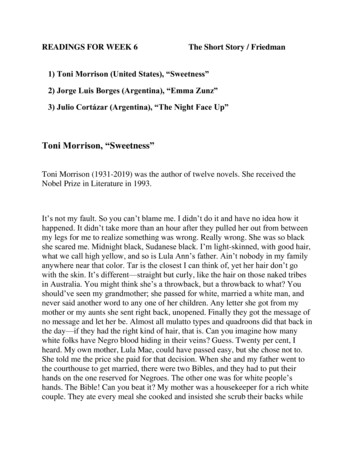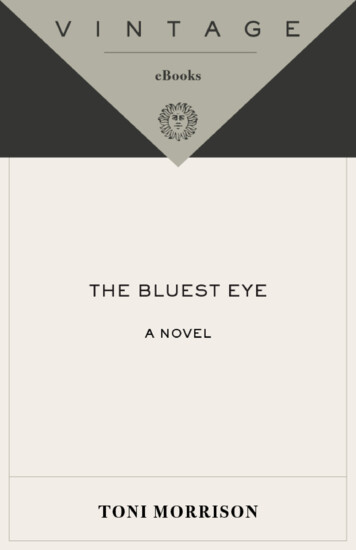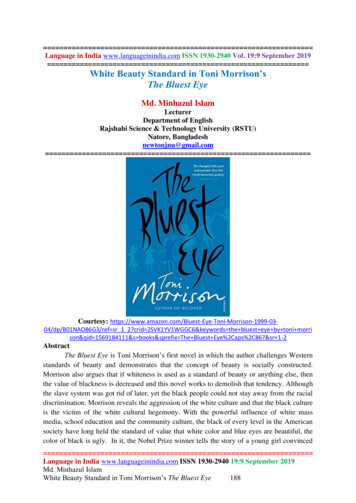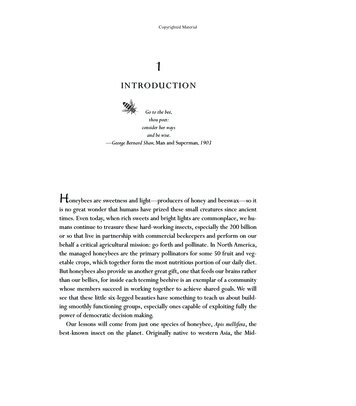
Transcription
READINGS FOR WEEK 6The Short Story / Friedman1) Toni Morrison (United States), “Sweetness”2) Jorge Luis Borges (Argentina), “Emma Zunz”3) Julio Cortázar (Argentina), “The Night Face Up”Toni Morrison, “Sweetness”Toni Morrison (1931-2019) was the author of twelve novels. She received theNobel Prize in Literature in 1993.It’s not my fault. So you can’t blame me. I didn’t do it and have no idea how ithappened. It didn’t take more than an hour after they pulled her out from betweenmy legs for me to realize something was wrong. Really wrong. She was so blackshe scared me. Midnight black, Sudanese black. I’m light-skinned, with good hair,what we call high yellow, and so is Lula Ann’s father. Ain’t nobody in my familyanywhere near that color. Tar is the closest I can think of, yet her hair don’t gowith the skin. It’s different—straight but curly, like the hair on those naked tribesin Australia. You might think she’s a throwback, but a throwback to what? Youshould’ve seen my grandmother; she passed for white, married a white man, andnever said another word to any one of her children. Any letter she got from mymother or my aunts she sent right back, unopened. Finally they got the message ofno message and let her be. Almost all mulatto types and quadroons did that back inthe day—if they had the right kind of hair, that is. Can you imagine how manywhite folks have Negro blood hiding in their veins? Guess. Twenty per cent, Iheard. My own mother, Lula Mae, could have passed easy, but she chose not to.She told me the price she paid for that decision. When she and my father went tothe courthouse to get married, there were two Bibles, and they had to put theirhands on the one reserved for Negroes. The other one was for white people’shands. The Bible! Can you beat it? My mother was a housekeeper for a rich whitecouple. They ate every meal she cooked and insisted she scrub their backs while
they sat in the tub, and God knows what other intimate things they made her do,but no touching of the same Bible.Some of you probably think it’s a bad thing to group ourselves according to skincolor—the lighter the better—in social clubs, neighborhoods, churches, sororities,even colored schools. But how else can we hold on to a little dignity? How else canwe avoid being spit on in a drugstore, elbowed at the bus stop, having to walk inthe gutter to let whites have the whole sidewalk, being charged a nickel at thegrocer’s for a paper bag that’s free to white shoppers? Let alone all the namecalling. I heard about all of that and much, much more. But because of mymother’s skin color she wasn’t stopped from trying on hats or using the ladies’room in the department stores. And my father could try on shoes in the front part ofthe shoe store, not in a back room. Neither one of them would let themselves drinkfrom a “Colored Only” fountain, even if they were dying of thirst.I hate to say it, but from the very beginning in the maternity ward the baby, LulaAnn, embarrassed me. Her birth skin was pale like all babies’, even African ones,but it changed fast. I thought I was going crazy when she turned blue-black rightbefore my eyes. I know I went crazy for a minute, because—just for a fewseconds—I held a blanket over her face and pressed. But I couldn’t do that, nomatter how much I wished she hadn’t been born with that terrible color. I eventhought of giving her away to an orphanage someplace. But I was scared to be oneof those mothers who leave their babies on church steps. Recently, I heard about acouple in Germany, white as snow, who had a dark-skinned baby nobody couldexplain. Twins, I believe—one white, one colored. But I don’t know if it’s true. AllI know is that, for me, nursing her was like having a pickaninny sucking my teat. Iwent to bottle-feeding soon as I got home.My husband, Louis, is a porter, and when he got back off the rails he looked at melike I really was crazy and looked at the baby like she was from the planet Jupiter.He wasn’t a cussing man, so when he said, “God damn! What the hell is this?” Iknew we were in trouble. That was what did it—what caused the fights betweenme and him. It broke our marriage to pieces. We had three good years together, butwhen she was born he blamed me and treated Lula Ann like she was a stranger—more than that, an enemy. He never touched her.I never did convince him that I ain’t never, ever fooled around with another man.He was dead sure I was lying. We argued and argued till I told him her blacknesshad to be from his own family—not mine. That was when it got worse, so bad hejust up and left and I had to look for another, cheaper place to live. I did the best I
could. I knew enough not to take her with me when I applied to landlords, so I lefther with a teen-age cousin to babysit. I didn’t take her outside much, anyway,because, when I pushed her in the baby carriage, people would lean down and peekin to say something nice and then give a start or jump back before frowning. Thathurt. I could have been the babysitter if our skin colors were reversed. It was hardenough just being a colored woman—even a high-yellow one—trying to rent in adecent part of the city. Back in the nineties, when Lula Ann was born, the law wasagainst discriminating in who you could rent to, but not many landlords paidattention to it. They made up reasons to keep you out. But I got lucky with Mr.Leigh, though I know he upped the rent seven dollars from what he’d advertised,and he had a fit if you were a minute late with the money.I told her to call me “Sweetness” instead of “Mother” or “Mama.” It was safer. Herbeing that black and having what I think are too thick lips and calling me “Mama”would’ve confused people. Besides, she has funny-colored eyes, crow black with ablue tint—something witchy about them, too.So it was just us two for a long while, and I don’t have to tell you how hard it isbeing an abandoned wife. I guess Louis felt a little bit bad after leaving us like that,because a few months later on he found out where I’d moved to and startedsending me money once a month, though I never asked him to and didn’t go tocourt to get it. His fifty-dollar money orders and my night job at the hospital gotme and Lula Ann off welfare. Which was a good thing. I wish they would stopcalling it welfare and go back to the word they used when my mother was a girl.Then it was called “relief.” Sounds much better, like it’s just a short-term breatherwhile you get yourself together. Besides, those welfare clerks are mean as spit.When finally I got work and didn’t need them anymore, I was making more moneythan they ever did. I guess meanness filled out their skimpy paychecks, which waswhy they treated us like beggars. Especially when they looked at Lula Ann andthen back at me—like I was trying to cheat or something. Things got better but Istill had to be careful. Very careful in how I raised her. I had to be strict, verystrict. Lula Ann needed to learn how to behave, how to keep her head down andnot to make trouble. I don’t care how many times she changes her name. Her coloris a cross she will always carry. But it’s not my fault. It’s not my fault. It’s not.Oh, yeah, I feel bad sometimes about how I treated Lula Ann when she was little.But you have to understand: I had to protect her. She didn’t know the world. Withthat skin, there was no point in being tough or sassy, even when you were right.Not in a world where you could be sent to a juvenile lockup for talking back orfighting in school, a world where you’d be the last one hired and the first one fired.
She didn’t know any of that or how her black skin would scare white people ormake them laugh and try to trick her. I once saw a girl nowhere near as dark asLula Ann who couldn’t have been more than ten years old tripped by one of agroup of white boys and when she tried to scramble up another one put his foot onher behind and knocked her flat again. Those boys held their stomachs and bentover with laughter. Long after she got away, they were still giggling, so proud ofthemselves. If I hadn’t been watching through the bus window I would have helpedher, pulled her away from that white trash. See, if I hadn’t trained Lula Annproperly she wouldn’t have known to always cross the street and avoid white boys.But the lessons I taught her paid off, and in the end she made me proud as apeacock.I wasn’t a bad mother, you have to know that, but I may have done some hurtfulthings to my only child because I had to protect her. Had to. All because of skinprivileges. At first I couldn’t see past all that black to know who she was and justplain love her. But I do. I really do. I think she understands now. I think so.Lasttwo times I saw her she was, well, striking. Kind of bold and confident. Each timeshe came to see me, I forgot just how black she really was because she was using itto her advantage in beautiful white clothes.Taught me a lesson I should have known all along. What you do to childrenmatters. And they might never forget. As soon as she could, she left me all alone inthat awful apartment. She got as far away from me as she could: dolled herself upand got a big-time job in California. She don’t call or visit anymore. She sends memoney and stuff every now and then, but I ain’t seen her in I don’t know how long.I prefer this place—Winston House—to those big, expensive nursing homesoutside the city. Mine is small, homey, cheaper, with twenty-four-hour nurses anda doctor who comes twice a week. I’m only sixty-three—too young for pasture—but I came down with some creeping bone disease, so good care is vital. Theboredom is worse than the weakness or the pain, but the nurses are lovely. One justkissed me on the cheek when I told her I was going to be a grandmother. Her smileand her compliments were fit for someone about to be crowned. I showed her thenote on blue paper that I got from Lula Ann—well, she signed it “Bride,” but Inever pay that any attention. Her words sounded giddy. “Guess what, S. I am so, sohappy to pass along this news. I am going to have a baby. I’m too, too thrilled andhope you are, too.” I reckon the thrill is about the baby, not its father, because shedoesn’t mention him at all. I wonder if he is as black as she is. If so, she needn’tworry like I did. Things have changed a mite from when I was young. Blue-blacksare all over TV, in fashion magazines, commercials, even starring in movies.
There is no return address on the envelope. So I guess I’m still the bad parent beingpunished forever till the day I die for the well-intended and, in fact, necessary wayI brought her up. I know she hates me. Our relationship is down to her sending memoney. I have to say I’m grateful for the cash, because I don’t have to beg forextras, like some of the other patients. If I want my own fresh deck of cards forsolitaire, I can get it and not need to play with the dirty, worn one in the lounge.And I can buy my special face cream. But I’m not fooled. I know the money shesends is a way to stay away and quiet down the little bit of conscience she’s gotleft.If I sound irritable, ungrateful, part of it is because underneath is regret. All thelittle things I didn’t do or did wrong. I remember when she had her first period andhow I reacted. Or the times I shouted when she stumbled or dropped something.True. I was really upset, even repelled by her black skin when she was born and atfirst I thought of . . . No. I have to push those memories away—fast. No point. Iknow I did the best for her under the circumstances. When my husband ran out onus, Lula Ann was a burden. A heavy one, but I bore it well.Yes, I was tough on her. You bet I was. By the time she turned twelve going onthirteen, I had to be even tougher. She was talking back, refusing to eat what Icooked, primping her hair. When I braided it, she’d go to school and unbraid it. Icouldn’t let her go bad. I slammed the lid and warned her about the names she’d becalled. Still, some of my schooling must have rubbed off. See how she turned out?A rich career girl. Can you beat it?Now she’s pregnant. Good move, Lula Ann. If you think mothering is all cooing,booties, and diapers you’re in for a big shock. Big. You and your namelessboyfriend, husband, pickup—whoever—imagine, Oooh! A baby! Kitchee kitcheekoo!Listen to me. You are about to find out what it takes, how the world is, how itworks, and how it changes when you are a parent.Good luck, and God help the child.1. What is the interplay of story and storyteller in “Sweetness.”2. How can one sense the presence of an implied author in this story?3. What are the key themes and messages of “Sweetness”?
Jorge Luis Borges, “Emma Zunz”“Emma Zunz” is from the collection El aleph by Jorge Luis Borges (Argentina,1899-1986).On January 14, 1922, when Emma Zunz returned home from the Tarbuch &Loewenthal weaving mill, she found a letter at the far end of the entryway to herbuilding; it had been sent from Brazil, and it informed her that her father had died.She was misled at first by the stamp and the envelope; then the unknownhandwriting made her heart flutter. Nine or ten smudgy lines covered almost theentire piece of paper; Emma read that Sr. Maier had accidentally ingested anoverdose of veronal and died on the third inst. in the hospital at Bagé. The letterwas signed by a resident of the rooming house in which her father had lived, oneFein or Fain, in Rio Grande; he could not have known that he was writing to thedead man's daughter. Emma dropped the letter. The first thing she felt was asinking in her stomach and a trembling in her knees; then, a sense of blind guilt, ofunreality, of cold, of fear; then, a desire for this day to be past. Then immediatelyshe realized that such a wish was pointless, for her father's death was the only thingthat had happened in the world, and it would go on happening, endlessly, foreverafter. She picked up the piece of paper and went to her room. Furtively, she put itaway for safekeeping in a drawer, as though she somehow knew what was coming.She may already have begun to see the things that would happen next; she wasalready the person she was to become. In the growing darkness, and until the endof that day, Emma wept over the suicide of Manuel Maier, who in happier daysgone by had been Emanuel Zunz. She recalled summer outings to a small farmnear Gualeguay, she recalled (or tried to recall) her mother, she recalled thefamily's little house in Lanus* that had been sold at auction, she recalled the yellowlozenges of a window, recalled the verdict of prison, the disgrace, the anonymousletters with the newspaper article about the "Embezzlement of Funds by Teller,"recalled (and this she would never forget) that on the last night, her father hadsworn that the thief was Loewenthal—Loewenthal, Aaron Loewenthal, formerlythe manager of the mill and now one of its owners. Since 1916, Emma had kept thesecret. She had revealed it to no one, not even to Elsa Urstein, her best friend.Perhaps she shrank from it out of profane incredulity; perhaps she thought that thesecret was the link between herself and the absent man. Loewenthal didn't knowshe knew; Emma Zunz gleaned from that minuscule fact a sense of power.
She did not sleep that night, and by the time first light defined the rectangleof the window, she had perfected her plan. She tried to make that day (whichseemed interminable to her) be like every other. In the mill, there were rumors of astrike; Emma declared, as she always did, that she was opposed to all forms ofviolence. At six, when her workday was done, she went with El sato, a women'sclub that had a gymnasium and a swimming pool. They joined; she had to repeatand then spell her name; she had to applaud the vulgar jokes that accompanied thestruggle to get it correct. She discussed with Elsa and the younger of the Kronfussgirls which moving picture they would see Sunday evening. And then there wastalk of boyfriends; no one expected Emma to have anything to say. In April shewould be nineteen, but men still inspired in her an almost pathological fear.Home again, she made soup thickened with manioc flakes and somevegetables, ate early, went to bed, and forced herself to sleep. Thus passed Fridaythe fifteenth—a day of work, bustle, and trivia—the day before the day. OnSaturday, impatience wakened her. Impatience, not nervousness or secondthoughts—and the remarkable sense of relief that she had reached this day at last.There was nothing else for her to plan or picture to herself; within a few hours shewould have come to the simplicity of the fait accompli. She read in La Prensa thatthe Nordstjärnan, from Malmö, was to weigh anchor that night from Pier 3; shetelephoned Loewenthal, insinuated that she had something to tell him, inconfidence, about the strike, and promised to stop by his office at nightfall. Hervoice quivered; the quiver befitted a snitch. No other memorable event took placethat morning. Emma worked until noon and then settled with Perla Kronfuss andEisa on the details of their outing on Sunday. She lay down after lunch and withher eyes closed went over the plan she had conceived. She reflected that the finalstep would be less horrible than the first, and would give her, she had no doubt ofit, the taste of victory, and of justice. Suddenly, alarmed, she leaped out of bed andran to the dressing table drawer. She opened it; under the portrait of Milton Sills,where she had left it night before last, she found Pain's letter. No one could haveseen it; she began to read it, and then she tore it up. To recount with some degreeof reality the events of that evening would be difficult, and perhaps inappropriate.One characteristic of hell is its unreality, which might be thought to mitigate hell'sterrors but perhaps makes them all the worse. How to make plausible an act inwhich even she who was to commit it scarcely believed? How to recover thosebrief hours of chaos that Emma Zunz's memory today repudiates and confuses?Emma lived in Amalgro, on Calle Liniers; we know that that evening she wentdown to the docks. On the infamous Paseo de Julio she may have seen herselfmultiplied in mirrors, made public by lights, and stripped naked by hungry eyes—but it is more reasonable to assume that at first she simply wandered, unnoticed,through the indifferent streets. She stepped into two or three bars, observed the
routine or the maneuvers of other women. Finally she ran into some men from theNordstjärnan. One of them, who was quite young, she feared might inspire in hersome hint of tenderness, so she chose a different one—perhaps a bit shorter thanshe, and foul-mouthed—so that there might be no mitigation of the purity of thehorror. The man led her to a door and then down a gloomy entryway and then to atortuous stairway and then into a vestibule (with lozenges identical to those of thehouse in Lanús) and then down a hallway and then to a door that closed behindthem. The most solemn of events are outside time—whether because in the mostsolemn of events the immediate past is severed, as it were, from the future orbecause the elements that compose those events seem not to be consecutive. In thattime outside time, in that welter of disjointed and horrible sensations, did EmmaZunz think even once about the death that inspired the sacrifice? In my view, shethought about it once, and that was enough to endanger her desperate goal. Shethought (she could not help thinking) that her father had done to her mother thehorrible thing being done to her now. She thought it with weak-limbedastonishment, and then, immediately, took refuge in vertigo. The man—a Swede orFinn— did not speak Spanish; he was an instrument for Emma, as she was forhim—but she was used for pleasure, while he was used for justice. When she wasalone, Emma did not open her eyes immediately. On the night table was the moneythe man had left. Emma sat up and tore it to shreds, as she had torn up the letter ashort time before. Tearing up money is an act of impiety, like throwing awaybread; the minute she did it, Emma wished she hadn't—an act of pride, and on thatday. Foreboding melted into the sadness of her body, into the revulsion. Sadnessand revulsion lay upon Emma like chains, but slowly she got up and began todress. The room had no bright colors; the last light of evening made it all thedrearier. She managed to slip out without being seen. On the corner she mounted awestbound Lacroze and following her plan, she sat in the car's frontmost seat, sothat no one would see her face. Perhaps she was comforted to see, in the banalbustle of the streets, that what had happened had not polluted everything. She rodethrough gloomy, shrinking neighborhoods, seeing them and forgetting theminstantly, and got off at one of the stops on Warnes. Paradoxically, her wearinessturned into a strength, for it forced her to concentrate on the details of her missionand masked from her its true nature and its final purpose.Aaron Loewenthal was in the eyes of all an upright man; in those of his fewclosest acquaintances, a miser. He lived above the mill, alone. Living in the rundown slum, he feared thieves; in the courtyard of the mill there was a big dog, andin his desk drawer, as everyone knew, a revolver. The year before, he haddecorously grieved the unexpected death of his wife—a Gauss! who'd brought himan excellent dowry!—but money was his true passion. With secret shame, he knewhe was not as good at earning it as at holding on to it. He was quite religious; he
believed he had a secret pact with the Lord—in return for prayers and devotions,he was exempted from doing good works. Bald, heavyset, dressed in mourning,with his dark lensed pince-nez and blond beard, he was standing next to thewindow, awaiting the confidential report from operator Zunz. He saw her pushopen the gate (which he had left ajar on purpose) and cross the gloomy courtyard.He saw her make a small detour when the dog (tied up on purpose) barked.Emma's lips were moving, like those of a person praying under her breath; weary,over and over they rehearsed the phrases that Sr. Loewenthal would hear before hedied.Things didn't happen the way Emma Zunz had foreseen. Since early theprevious morning, many times she had dreamed that she would point the firmrevolver, force the miserable wretch to confess his miserable guilt, explain to himthe daring stratagem that would allow God's justice to triumph over man's.(It wasnot out of fear, but because she was an instrument of that justice, that she herselfintended not to be punished.) Then, a single bullet in the center of his chest wouldput an end to Loewenthal's life. But things didn't happen that way. Sitting beforeAaron Loewenthal, Emma felt (more than the urgency to avenge her father) theurgency to punish the outrage she herself had suffered. She could not not kill him,after being so fully and thoroughly dishonored. Nor did she have time to waste ontheatrics. Sitting timidly in his office, she begged Loewenthal's pardon, invoked (inher guise as snitch) the obligations entailed by loyalty, mentioned a few names,insinuated others, and stopped short, as though overcome by fearfulness. Herperformance succeeded; Loewenthal went out to get her a glass of water. By thetime he returned from the dining hall, incredulous at the woman's flutteringperturbation yet full of solicitude, Emma had found the heavy revolver in thedrawer. She pulled the trigger twice. Loewenthal's considerable body crumpled asthough crushed by the explosions and the smoke; the glass of water shattered; hisface looked at her with astonishment and fury; the mouth in the face cursed her inSpanish and in Yiddish. The filthy words went on and on; Emma had to shoot himagain. Down in the courtyard, the dog, chained to his post, began barkingfuriously, as a spurt of sudden blood gushed from the obscene lips and sullied thebeard and clothes. Emma began the accusation she had prepared ("I have avengedmy father, and I shall not be punished .") but she didn't finish it, because Sr.Loewenthal was dead. She never knew whether he had managed to understand.The dog's tyrannical barking reminded her that she couldn't rest, not yet. Shemussed up the couch, unbuttoned the dead man's suit coat, removed his spatteredpince-nez and left them on the filing-cabinet. Then she picked up the telephone andrepeated what she was to repeat so many times, in those and other words:Something has happened, something unbelievable. Sr. Loewenthal sent for me onthe pretext of the strike. He raped me --- I killed him ----The story was
unbelievable, yes—and yet it convinced everyone, because in substance it wastrue. Emma Zunz's tone of voice was real, her shame was real, her hatred was real.The outrage that had been done to her was real, as well; all that was false were thecircumstances, the time, and one or two proper names.Translated by Andrew Hurley1.2.3.4.5.How can one describe the role of the narrator of “Emma Zunz”?What is the basis of the suspense in the story?What precisely is Emma Zunz’s plan?Does the plan work?What is the narrator’s judgment at the end of the story?
Julio Cortázar, “The Night Face Up”The title of “The Night Face Up” in Spanish is “La noche boca arriba.” JulioCortázar (Argentina, 1914-1984) is the author of numerous novels, short stories,other literary works, and essays, the most famous of which is the novel Rayuela,translated as Hopscotch (1963). He is associated with the movement known as theLatin American Boom. Michelangelo Antonioni’s film Blowup (1966) is based ona Cortázar short story, “The Devil’s Spittle” (“Las babas del diablo”).And in certain epochs they would go to hunt enemies;They called this the war of flowers.It had to be late, he thought in the middle of the hotel’s long corridor, and hurriedonto the street to the motorcycle in the corner where the concierge next door hadallowed him to park. In the corner jeweler’s he saw that it was 8:50; he’d arrivewhere he was going in more than enough time. The sun filtered through the tallbuildings downtown and, because he needed no name to think, he got on themachine savoring the excursion. The bike purred between his legs and his pantssuccumbed to the whips of fresh wind.The ministries in pink and white went by, then a series of stores on Central Streetwith brilliant shop windows. Now he entered the most pleasurable part of thecommute, the true journey: a long street lined with trees with little traffic and hugevillas which let their gardens come up to the pavements, hardly marked by lowhedges. Somewhat distracted by perhaps, but keeping to the right side as wasproper, he let himself go to the smoothness, to the light tension of that day hardlybegun. Perhaps his involuntary relaxation prevented him from avoiding theaccident. When he saw that the woman standing at the corner was rushing onto theroad despite the green lights, it was already too late for simple solutions. Strayingto the left, he braked with his foot and hand; he heard the woman’s shouts, andwith the collision lost his vision. It was as if he had suddenly fallen asleep.
Having fainted, he woke violently. Four or five young men were pulling out himfrom beneath his cycle. He felt the taste of salt, the taste of blood, his knee hurt,and he shouted once they lifted him out because the pressure on his right arm wasunbearable. Voices that didn’t seem to belong to the faces suspended above himtried to encourage him with jokes and assurances. His only consolation washearing someone confirm that he had had the right of way crossing that corner.Trying to control the nausea stirring in his throat, he asked about the woman.While they were taking him face up to a nearby pharmacy, he learned that thereason for the accident didn’t have anything more than scratches on her legs. “Youhardly grazed her, but the collision made your bike jump sideways.” Opinions,memories: lay him down slowly; yes, like that; and someone in a work coat gavehim a drink which relieved him in the shade of a small neighborhood pharmacy.The police ambulance arrived within five minutes. They put him onto a whitestretcher where he could lie comfortably. In all lucidity, but knowing that he wasstill under the effects of a terrible collision, he gave his address to the policemanaccompanying him. His arm, he said, almost didn’t hurt him anymore. Blood waspouring out onto his whole face from a cut in his brow. He licked his lips once ortwice to drink some. He felt good: it was an accident; bad luck. A few weeks notmoving and that’d be that. The guard told him that his motorcycle didn’t seem tobe too damaged. “Naturally,” he said, “since the whole thing landed on top ofme.” They both laughed. Then the guard shook his hand as they arrived at thehospital and wished him good luck. His nausea was already coming back bit by bit.They took him by gurney to the back building, passing under trees full of birds. Heclosed his eyes and wished he were asleep or chloroformed. But they kept him fora long time in a room with that hospital smell filling out a form, taking off hisclothes and putting on a grayish, stiff shirt. They moved his arm carefully withoutcausing him any pain. All the while, the nurses were telling jokes. And if it hadn’tbeen for the contractions in his stomach, he would have felt very well indeed.Almost happy.They took him to radiography. Twenty minutes later, with his wet sheets stillclinging to his breast like a black gravestone, he went on to the operation room.Someone tall, slim and dressed in white came up to him and began examining thecharts. A woman’s hands made his head more comfortable, and he felt that he wasmoving from one gurney to another. Smiling, the man in white approached himagain with something shiny in his right hand. He placed his hand on his cheek andsignaled to someone standing behind him.
A strange dream, this, because it was full of smells and he had never dream
READINGS FOR WEEK 6 The Short Story / Friedman 1) Toni Morrison (United States), “Sweetness” 2) Jorge Luis Borges (Argentina), “Emma Zunz” 3) Julio Cortázar (Argentina), “The Night










